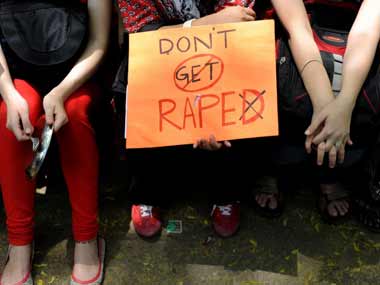Insensitivity towards rape and rape survivors may not be new, although one has higher expectations of leaders and those in positions of power. The latest gem is by Karnataka Assembly Speaker KR Ramesh Kumar, who said
he felt like a rape survivor in the House on Tuesday. Why? Not because he was actually raped, but because he was questioned in connection with a controversy that could implicate him in a bribery case. He made the statement in reference to the controversial audio tapes in which Karnataka BJP chief BS Yeddyurappa can purportedly be heard trying to poach a JD(S) MLA to bring down the Congress-JD(S) government. After his name was dragged into the controversy, Kumar said his “situation was like that of a rape victim, as they too are supposedly questioned about the incident repeatedly”. [caption id=“attachment_4276847” align=“alignleft” width=“380”] Representational image. AFP[/caption] Politicians and ministers have often made such callous statements on rape and drawn the anger of the public at large. Here’s a list of some of these remarks made in poor taste: ‘Victim as guilty as her rapists’ “Only five to six people are not the culprits. The victim is as guilty as her rapists. She should have called the culprits brothers and begged before them to stop. This could have saved her dignity and life. Can one hand clap? I don’t think so. Had she recited the Saraswati Mantra, she would not have boarded any bus after watching a movie with her boyfriend.” These were self-proclaimed godman
Asaram Bapu’s remarks after the horrific gangrape of a woman in Delhi in December 2012. Asaram was convicted of rape himself about a year later. ‘Boys will be boys, they commit mistakes’ This gem was by Samajwadi Party founder Mulayam Singh Yadav. In April 2014, while opposing the death penalty awarded to three men for gangrape, he had said: “Boys will be boys; they commit mistakes”. He had also accused girls of getting “friendly with boys and when they fight and have differences, they term it as rape”. He didn’t stop there. Mulayam Singh even said that it was “not possible for four men to rape a woman”. “I know of many such cases, where one person commits the rape and four people are named in the report,” he had said. ‘Two men doesn’t mean a gangrape’ KJ George, who was the Karnataka home minister in 2015, had said that a rape by two men could not be considered a gangrape, drawing criticism and anger. ‘Rapes on the rise because of population explosion’ In 2013, West Bengal chief minister Mamata Banerjee had said that the rising number of rape cases was connected to increasing population. “You say rape incidents are on the rise. But the population is also swelling. Is the population in the state the same as it was during the tenure of (the state’s second chief minister) BC Roy?” she had said. ‘Rapes happen in India, not Bharat’ In 2013, RSS chief Mohan Bhagwat had said rapes are an “urban crime caused by westernisation” and do not happen in rural India. “Crimes against women happening in urban India are shameful. It is a dangerous trend. But such crimes won’t happen in ‘Bharat’, or the rural areas of the country. You go to villages and forests of the country, and there will be no such incidents of gangrape or sex crimes.” ‘Ninety percent rapes are consensual sex gone wrong’ In 2012, Congress spokesperson Dharambir Goyat had
blamed women for the rising cases of rapes in Haryana and said: “I don’t feel any hesitation in saying that 90 percent of the girls want to have sex intentionally, but they don’t know they will be gang-raped further as they find some lusty and pervasive people on the way ahead.” He had said the statement the same month when Haryana had reported 17 gangrapes. ‘Misunderstanding between two parties’ The gangrape of a woman at Kolkata’s Park Street, and the subsequent remarks made by politicians drew even more anger as city leaders were in complete denial about the crime. Trinamool Congress leader Kakoli Ghosh Dastidar had dismissed the gangrape entirely and said it was not a rape case to begin with. “If you’re referring to the Park Street rape, that is a different case altogether. That was not at all a rape case. It was a misunderstanding between the two parties involved — between a lady and her client. This was not a rape,” she had said.
Politicians and ministers often make callous statements on rape and drawn the anger of the public at large. Karnataka Assembly Speaker KR Ramesh Kumar is not the first to make such remarks in poor taste.
Advertisement
End of Article


)
)
)
)
)
)
)
)
)



